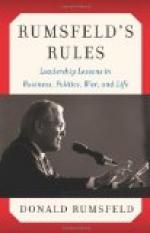What, then, is the situation to-day? That any day may bring the gravest news from South Africa, to be followed possibly by an ultimatum from a foreign coalition. In that event the Nation will have to choose between abandoning its Empire in obedience to foreign dictation, an abandonment which would mean National ruin, and a war for existence, a war for which no preparation has been made, which the Government is incompetent to conduct, and which would begin by a naval conflict during which it would be impossible to assist the Army in South Africa. That is the situation. It may take a turn for better; you cannot be quite sure that a storm which you see brewing may not pass off, but the probabilities are that the struggle for existence is at hand. What then is our duty, the duty of every one of us? To support the Government which cannot govern? Not for a moment, but to get rid of it as soon as possible and to make at once a Government that will try. Lord Rosebery at least sees the situation and understands the position. There is no other public man who commands such general confidence, and it is practically certain that if the Cabinet were compelled to resign by an adverse vote of the House of Commons Lord Rosebery would be the first statesman to be consulted by the Queen. Lord Rosebery could make a Government to-morrow if he would ignore parties and pick out the competent men wherever they are to be found. Any new Cabinet, except one containing Mr. Morley or Sir Henry Campbell-Bannerman, would be given a chance. The House of Commons would wait a few weeks to see how it bore itself. If there were prompt evidences of knowledge and will in the measures adopted, even though half the Ministers or all of them except Lord Rosebery were new men, there would soon be a feeling of confidence, and the Nation, knowing that it was led, would respond with enthusiasm. In that case Great Britain might make a good fight, though no one who knows the state of our preparations and those of the rest of the world will make a sanguine prediction as to the result.
TRY, TRY, TRY AGAIN
February 8th, 1900
Sir Redvers Buller on Monday set out on his third attempt to relieve Ladysmith. He appears to have made a feint against the Boer position north of Potgieter’s Drift, and, while there attracting the attention of the Boers by the concentrated fire of many guns, to have pushed a force of infantry and artillery across the river to the right of Potgieter’s Drift. This force, of which the infantry belongs to Lyttelton’s brigade, carried and defended against counter attack a hill called Vaal Krantz, at the eastern end of the Brakfontein ridge. To the east of Vaal Krantz runs a good road to Ladysmith, along which the distance from the Tugela to Sir George’s White’s outposts is about ten miles. To the east again of the road is a hill called Dorn Kop. Here the Boers have an artillery position which seems to command Vaal Krantz, and they probably have the usual infantry trenches. The Boer position then faces the Tugela and runs from Spion Kop on the west, the Boer left, to Dorn Kop on the east, the Boer right. Sir Redvers Buller’s attack is an attempt to pierce the centre of this position.




